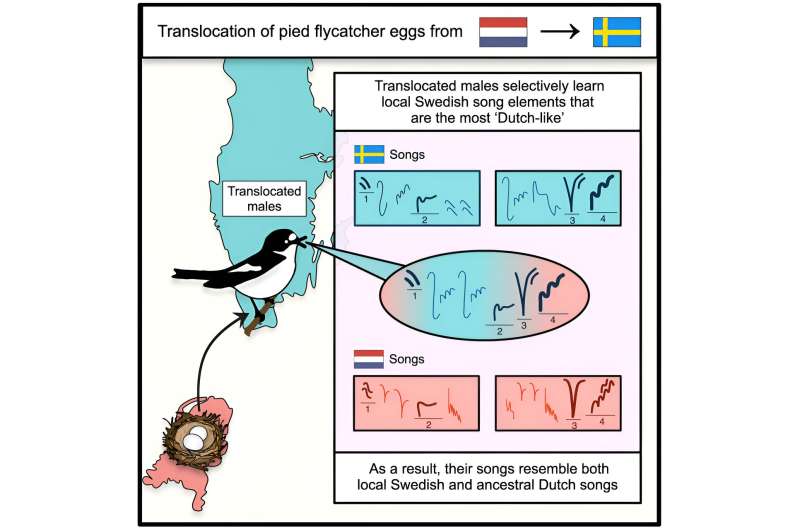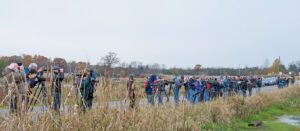Wild birds possess genetic predispositions to learn population-specific songs, study finds


Genetic predispositions guide population-specific song learning in wild birds, shows new research from Stockholm University. By studying adult pied flycatchers that had been translocated as eggs from the Netherlands to Sweden, the researchers found that the songs of translocated birds resembled both their social environment in Sweden as well as their ancestral Dutch population.
These results show how genetic differences can impact cultural change in birdsong and how they can, together, contribute to mating barriers between bird populations.
“In nearly half of the world’s bird species, bird songs are learned socially, by imitating the songs of adults, much like how human children learn languages,” says Samyuktha Rajan who is a Ph.D. student at Stockholm University and the lead author of the study published in Current Biology.
As individuals learn songs from one another, mistakes inevitably occur, leading to variation in songs across populations of the same species, similarly to the formation of human languages. In birds, these differences are often enough to reduce mating between individuals from different populations.
Despite decades of interest in how population differences in learned song arise, a long-term mystery is how these differences persist when individuals disperse between populations. Individuals moving from one population to another should bring with them their own population’s songs, resulting in the collapse of any accumulated song differences between populations.
To answer this, researchers at Stockholm University collaborated with researchers at the University of Groningen. The researchers translocated pied flycatcher eggs from a population in the Netherlands to Sweden, where they were reared by Swedish parents.
The researchers then compared the songs produced by adult males that hatched from these translocated eggs to those of their ancestral Dutch population and their local foster Swedish population.
“We found that the songs of translocated males were overall very similar to the Swedish population –underscoring the importance of social learning in song development. Interestingly though, the translocated males selectively learned those Swedish song elements that were most similar to the Dutch population, despite never having been exposed to Dutch songs. This resulted in their songs resembling both the local Swedish population and their ancestral Dutch population,” says Rajan.
“This suggests that in addition to the critical role of the social environment, pied flycatchers also possess genetic predispositions to learn songs of their population of origin.”
These findings shed light on how genetic differences can impact cultural change. The researchers propose that as songs continue to diverge between the populations, genetic predispositions should diverge in concert. Over time, this process might reduce the likelihood that individuals originating from different populations would mate with one another, thereby driving the formation of new species.
More information:
Samyuktha Rajan et al, Translocated wild birds are predisposed to learn songs of their ancestral population, Current Biology (2024). DOI: 10.1016/j.cub.2024.04.061
Provided by
Stockholm University
Citation:
Wild birds possess genetic predispositions to learn population-specific songs, study finds (2024, May 22)
retrieved 22 May 2024
from https://phys.org/news/2024-05-wild-birds-genetic-predispositions-population.html
This document is subject to copyright. Apart from any fair dealing for the purpose of private study or research, no
part may be reproduced without the written permission. The content is provided for information purposes only.



